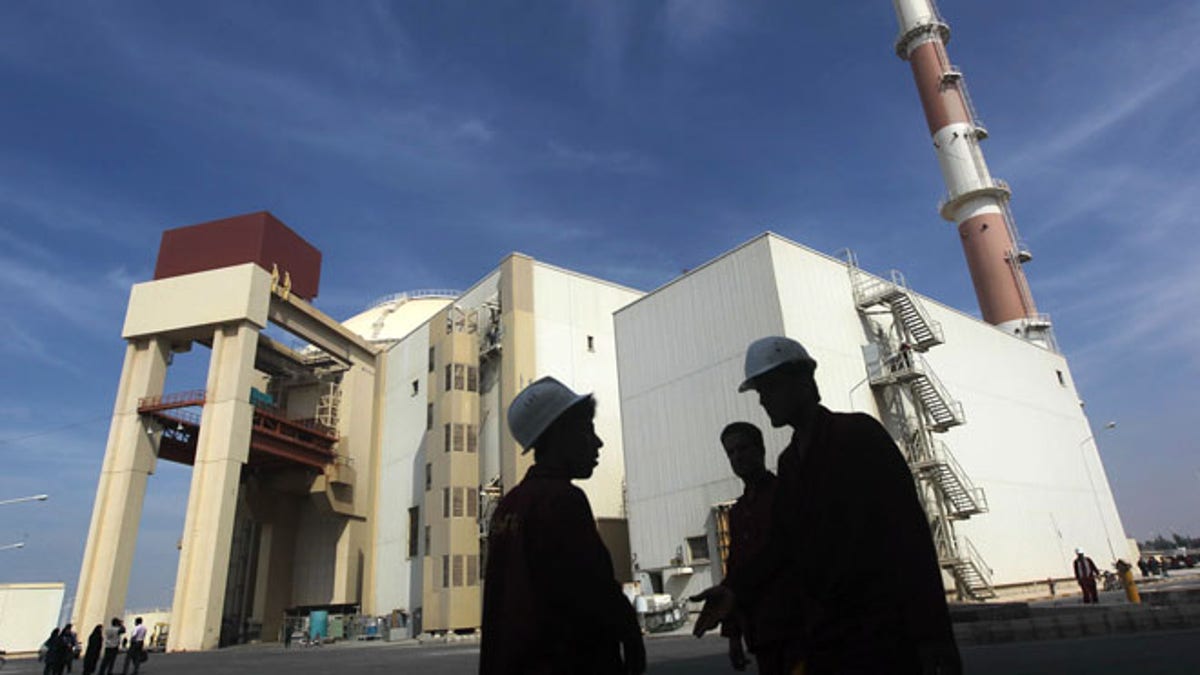
Oct. 26, 2010: Iranian workers stand in front of the Bushehr nuclear power plant, about 1,200 km south of Tehran. (Reuters)
The United States is considering softening demands that Iran gut its uranium enrichment program, instead floating a new proposal that would allow Tehran to keep almost half of the program intact, diplomats say.
The initiative, reported late Thursday by The Associated Press, comes as Iranian President Hassan Rouhani has sought to leverage the crisis in the Middle East to ease sanctions on his country as part of nuclear talks, suggesting in a United Nations address that security cooperation between Iran and other countries could only occur if they struck a favorable nuclear deal.
While focusing in large part on Islamic extremists in the region, Rouhani made clear Iran’s cooperation in addressing these threats hinges on the outcome of ongoing nuclear talks – as he once again urged other nations to drop what he described as “excessive demands.”
The U.S., fearing Tehran may enrich to weapons-grade level used to arm nuclear warheads, ideally wants no more than 1,500 centrifuges left operating. Iran insists it wants to use the technology only to make reactor fuel and for other peaceful purposes and insists it be allowed to run at least the present 9,400 machines.
The tentative new U.S. offer attempts to meet the Iranians close to half way on numbers, diplomats told The Associated Press. They said it envisages letting Iran keep up to 4,500 centrifuges but would reduce the stock of uranium gas fed into the machines to the point where it would take more than a year of enriching to create enough material for a nuclear warhead.
That, they said, would give the international community enough lead time to react to any such attempt.
Rouhani said a deal could mark the “beginning of multilateral cooperation” and allow for “greater focus on some very important regional issues such as combating violence and extremism.”
Iran insists it does not want atomic arms but the West is only willing to lift nuclear-related sanctions if Tehran agrees to substantially shrink enrichment and other activities that Iran could turn toward making such weapons.
The diplomats emphasized that the proposal is only one of several being discussed by the six powers -- the U.S., Russia, China, Britain, France and Germany -- and has not yet been formally submitted to the Iranians.
The new proposals reflect Washington's desire to advance the talks ahead of a Nov. 24 deadline that was extended from July.
They are running up against a Nov. 24 deadline to reach a comprehensive agreement to curb Iran’s nuclear activities in exchange for easing sanctions.
GOP lawmakers have also warned that the Obama administration may be willing to give too much ground to Iran in pursuit of an agreement.
Failure to seal a deal could see a return to confrontation, including U.S. and Israeli threats of military means as a last resort to slow Iran's nuclear program.
"My message to Iran's leaders and people is simple: Do not let this opportunity pass," President Obama said Wednesday in his own address to world leaders.
At the same time, Rouhani has been critical of the U.S. bombing campaign of Islamic State group strongholds and the growing coalition of countries seeking to stop the extremists by military means. "Bombing and airstrikes are not the appropriate way," Rouhani said in his address to the United Nations, warning that "extraterritorial interference ... in fact only feeds and strengthens terrorism."
There are other issues that could further complicate negotiations. American officials are furious with Iran for detaining Jason Rezarian, a Washington Post journalist who has both American and Iranian citizenship, as well as his wife.
Iranian officials have not specifically said why the couple is being held, and Rouhani has dodged questions about their fate. Asked again Wednesday about Rezarian, he said he would be freed if he is innocent of any crime.
The Associated Press contributed to this report.




